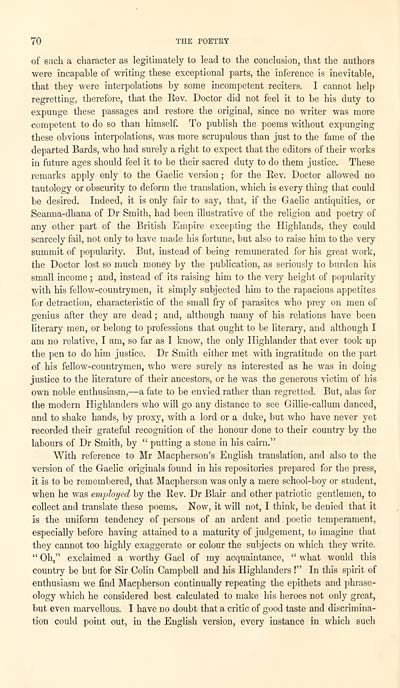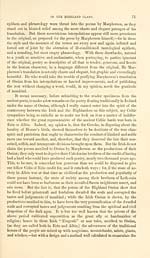Download files
Complete book:
Individual page:
Thumbnail gallery: Grid view | List view

70 THE POETBY
of such a character as legitimately to lead to the conclusion, that the authors
were incapable of writing these exceptional parts, the inference is inevitable,
that they were interpolations by some incompetent reciters. I cannot help
regretting, therefore, that the Kev. Doctor did not feel it to be his duty to
expunge these passages and restore the original, since no writer was more
competent to do so than himself. To publish the poems without expunging
these obvious interpolations, was more scrupulous than just to the fame of the
departed Bards, who had surely a right to expect that the editors of their works
in future ages should feel it to be their sacred duty to do them justice. These
remarks apply only to the Gaelic version ; for the Eev. Doctor allowed no
tautology or obscurity to deform the translation, which is every thing that could
be desired. Indeed, it is only fair to say, that, if the Gaelic antiquities, or
Seanna-dhana of Dr Smith, had been illustrative of the religion and poetry of
any other part of the British Empire excepting the Highlands, they could
scarcely fail, not only to have made his fortune, but also to raise him to the very
summit of popularity. But, instead of being remunerated for his great work,
the Doctor lost so much money by the publication, as seriously to burden his
small income ; and, instead of its raising him to the very height of popularity
with his fellow-countrymen, it simply subjected him to the rapacious appetites
for detraction, characteristic of the small fry of parasites who prey on men of
genius after they are dead ; and, although many of his relations have been
literary men, or belong to professions that ought to be literary, and although I
am no relative, I am, so far as I know, the only Highlander that ever took up
the pen to do him justice. Dr Smith either met with ingratitude on the part
of his fellow-countrymen, who were surely as interested as he was in doing
justice to the literature of their ancestors, or he was the generous victim of his
own noble enthusiasm, — a fate to be envied rather than regretted. But, alas for
the modern Highlanders who will go any distance to see Gillie-callum danced,
and to shake hands, by proxy, with a lord or a duke, but who have never yet
recorded their grateful recognition of the honour done to their country by the
labours of Dr Smith, by " putting a stone in his cairn."
With reference to Mr Macpherson's English translation, and also to the
version of the Gaelic originals found in his repositories prepared for the press,
it is to be remembered, that Macpherson was only a mere school-boy or student,
when he was employed by the Rev. Dr Blair and other patriotic gentlemen, to
collect and translate these poems. Now, it will not, I think, be denied that it
is the uniform tendency of persons of an ardent and poetic temperament,
especially before having attained to a maturity of judgement, to imagine that
they cannot too highly exaggerate or colour the subjects on which they write.
" Oh," exclaimed a worthy Gael of my acquaintance, " what would this
country be but for Sir Colin Campbell and his Highlanders !" In this sjairit of
enthusiasm we find Macpherson continually repeating the epithets and phrase-
ology which he considered best calculated to make his heroes not only great,
but even marvellous. I have no doubt that a critic of good taste and discrimina-
tion could point out, in the English version, every instance in which such
of such a character as legitimately to lead to the conclusion, that the authors
were incapable of writing these exceptional parts, the inference is inevitable,
that they were interpolations by some incompetent reciters. I cannot help
regretting, therefore, that the Kev. Doctor did not feel it to be his duty to
expunge these passages and restore the original, since no writer was more
competent to do so than himself. To publish the poems without expunging
these obvious interpolations, was more scrupulous than just to the fame of the
departed Bards, who had surely a right to expect that the editors of their works
in future ages should feel it to be their sacred duty to do them justice. These
remarks apply only to the Gaelic version ; for the Eev. Doctor allowed no
tautology or obscurity to deform the translation, which is every thing that could
be desired. Indeed, it is only fair to say, that, if the Gaelic antiquities, or
Seanna-dhana of Dr Smith, had been illustrative of the religion and poetry of
any other part of the British Empire excepting the Highlands, they could
scarcely fail, not only to have made his fortune, but also to raise him to the very
summit of popularity. But, instead of being remunerated for his great work,
the Doctor lost so much money by the publication, as seriously to burden his
small income ; and, instead of its raising him to the very height of popularity
with his fellow-countrymen, it simply subjected him to the rapacious appetites
for detraction, characteristic of the small fry of parasites who prey on men of
genius after they are dead ; and, although many of his relations have been
literary men, or belong to professions that ought to be literary, and although I
am no relative, I am, so far as I know, the only Highlander that ever took up
the pen to do him justice. Dr Smith either met with ingratitude on the part
of his fellow-countrymen, who were surely as interested as he was in doing
justice to the literature of their ancestors, or he was the generous victim of his
own noble enthusiasm, — a fate to be envied rather than regretted. But, alas for
the modern Highlanders who will go any distance to see Gillie-callum danced,
and to shake hands, by proxy, with a lord or a duke, but who have never yet
recorded their grateful recognition of the honour done to their country by the
labours of Dr Smith, by " putting a stone in his cairn."
With reference to Mr Macpherson's English translation, and also to the
version of the Gaelic originals found in his repositories prepared for the press,
it is to be remembered, that Macpherson was only a mere school-boy or student,
when he was employed by the Rev. Dr Blair and other patriotic gentlemen, to
collect and translate these poems. Now, it will not, I think, be denied that it
is the uniform tendency of persons of an ardent and poetic temperament,
especially before having attained to a maturity of judgement, to imagine that
they cannot too highly exaggerate or colour the subjects on which they write.
" Oh," exclaimed a worthy Gael of my acquaintance, " what would this
country be but for Sir Colin Campbell and his Highlanders !" In this sjairit of
enthusiasm we find Macpherson continually repeating the epithets and phrase-
ology which he considered best calculated to make his heroes not only great,
but even marvellous. I have no doubt that a critic of good taste and discrimina-
tion could point out, in the English version, every instance in which such
Set display mode to: Large image | Transcription
Images and transcriptions on this page, including medium image downloads, may be used under the Creative Commons Attribution 4.0 International Licence unless otherwise stated. ![]()
| Early Gaelic Book Collections > Blair Collection > Treatise on the language, poetry, and music of the Highland clans > (82) |
|---|
| Permanent URL | https://digital.nls.uk/76237305 |
|---|
| Description | A selection of books from a collection of more than 500 titles, mostly on religious and literary topics. Also includes some material dealing with other Celtic languages and societies. Collection created towards the end of the 19th century by Lady Evelyn Stewart Murray. |
|---|
| Description | Selected items from five 'Special and Named Printed Collections'. Includes books in Gaelic and other Celtic languages, works about the Gaels, their languages, literature, culture and history. |
|---|

